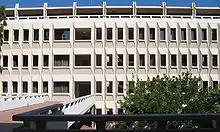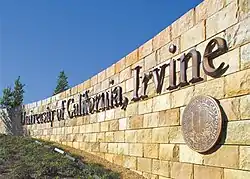University of California, Irvine School of Humanities
The School of Humanities is one of the academic units of the University of California, Irvine. Upon the school's opening in 1965, the Division of Humanities was one of the five liberal arts divisions that the campus had to offer. Samuel McCulloch was appointed as UC Irvine's founding dean of Humanities 1963.[1] The School hosts the Thesaurus Linguae Graecae[1] and the University of California Humanities Research Institute.[2]
| Type | Public |
|---|---|
| Established | 1965 |
Parent institution | University of California, Irvine |
| Dean | Tyrus Miller |
Academic staff | 170 |
| Students | 1917 |
| Undergraduates | 1609 |
| Postgraduates | 308 |
| Location | , California , United States |
| Website | http://www.humanities.uci.edu |

History
The division of humanities is one of the five liberal arts divisions that opened with the campus in 1965. In 1963, Samuel McCulloch was appointed as the founding dean of UC Irvine Division of Humanities and laid its foundation. Upon the campus' opening day, he created four departments within the division with a total of thirty-one faculty members. The four departments were: English and Comparative Literature, Foreign Languages and Literature, History, and Philosophy. By 1967, the governing body of UC Irvine turned the five liberal arts divisions into individual schools and the Division of Humanities had become the School of Humanities. In 1970 the Humanities Core Course was implemented and there was a focus on strengthening existing Humanities departments for the rest of the 1970s. The school also launched a doctorate in Critical Theory, making UC Irvine to be the only university in the country to offer a doctorate in the field. In the 1980s, Dean Ken Bailes founded the Organized Research Unit in Critical Theory and brought the system wide University of California Humanities Research Institute to UC Irvine. The School of Humanities started gaining national recognition and it expanded and grew throughout the 1990s and 2000s. The Humanities Instructional Building and Humanities Gateway were built and completed the Humanities Quad. The school today continues to expand by adding special programs and by creating cross collaboration with different schools on campus. The school has a total of 13 departments and over 20 majors and several interdisciplinary programs. [3]
Programs
The University of California, Irvine School of Humanities has various programs that are offered to the undergraduate and graduate students. Each program has their own faculty, classes, and events that are aimed to help students develop further into each respective field. Programs in the School of Humanities are among the highest-ranked in the country, contributing to UCI’s reputation as one of the very best public universities. [4]
African American Studies
African American Studies is an interdisciplinary program which offers undergraduate students an opportunity to study those societies and cultures established by the people of the African diaspora. The program focuses and encourages students to explore the African American experience from a variety of disciplinary perspectives and theoretical approaches. Some topics explored in this program is the process of colonization and the forced migration of African people, the position of African people in the western hemisphere, the rhetoric produced by and about African people, and the cultural and aesthetic values associated with "blackness" and "Africanness." This program offers a B.A. degree program in African American studies and a minor. [5]
Academic English
The Academic English is also known as the English as a Second Language Program (ESL), which offers English language courses for students at UCI. The program offers classes in academic writing, reading and vocabulary development, pronunciation, conversation, and grammar. The goal of the program's courses is to strengthen the English skills of students so they can complete the academic requirements of UCI. [5]
Culture and Theory
A Ph.D program offered to graduates in Culture and Theory. The program provides a strong theoretical and critical approach to race, gender, and sexuality studies. The program is most associated with interdisciplinary units in African American Studies, Asian American Studies, Chicano/Latino Studies, and Gender and Sexuality Studies, and works alongside the Critical Theory Emphasis. The program uses a problem-orientated approach to issues of race, gender, and sexuality. [5]
Global Cultures
In the Global Cultures Program, students are provided with the skills and knowledge that are necessary for understanding the complexity of the diverse world. The mission of the program is: Explore Globalization from a humanistic perspective. [6]
Humanities Core Course
Humanities Core Course is a year-long freshman program that focuses on developing critical reading and writing skills in relation to text and issues in the humanities. This course satisfies 6 general education requirements: 2 in lower-division writing,3 in Arts and Humanities, 1 in Multicultural Studies. [7]
Humanities Language and Learning Program
The learning of languages other than English helps foster global literacy and it helps bring international diversity to University of California, Irvine. This program provides instruction in languages not required for undergraduate and graduate degree programs. [8]
Religious Studies
A program that focuses on the ways different people from times have developed their values and traditions. The main mission is to understand the role of religion in human experience and thought. [9]
Special Programs
The School of Humanities also offer special programs such as: Humanities and Law, Asian Studies, Jewish Studies, Medical Humanities and Latin American Studies.
Degrees Offered
- African American Studies
- Art History
- Asian American Studies
- Chinese Studies
- Classics
- Comparative Literature
- Culture and Theory
- East Asian Cultures
- East Asian Languages and Literature
- English
- European Studies
- Film and Media Studies
- French
- Gender and Sexuality Studies
- German
- German Studies
- Global Cultures
- History
- Japanese Language and Literature
- Korean Literature and Culture
- Literary Journalism
- Philosophy
- Religious Studies
- Spanish
- Visual Studies
Departments
- Art History
- African American Studies
- Asian American Studies
- Classics
- Comparative Literature
- East Asian Studies
- English
- European Languages and Studies
- Film and Media Studies
- Gender and Sexuality Studies
- History
- Philosophy
- Spanish and Portuguese
Centers
- Center for Asian Studies
- Center for Armenian Studies
- Center for Critical Korean Studies
- Center for Culture and Capital
- Center for Knowledge, Technology and Society
- Center for Medical Humanities
- Center for the Study of Early Cultures
- Center for Jewish Studies[10]
- Critical Theory Institute
- International Center for Writing and Translation
- Latin American Studies Center
- Samuel Jordan Center for Persian Studies and Culture
- The Forum for the Academy and the Public
- Humanities Center
- New Swan Shakespeare Center
- Storytelling Center
- Thesaurus Linguae Gracae
People
Notable Faculty
- Jacques Derrida, French philosopher who was part of the School's faculty from 1986 until shortly before he died in 2004.[11][12]
- Murray Krieger, American literary critic and theorist. Krieger was the founder of the School's Critical Theory Institute.[13]
- Barry Siegel, Pulitzer-Prize winning journalist is founding director of the school's Literary Journalism Program.[14]
- Ngũgĩ wa Thiong'o, Kenyan writer and academic is founding director of the school's International Center for Writing and Translation.[15]
Deans
- Samuel McCulloch (1963-1969)
- Hazard Adams (1970-1972)
- William Lillyman (1974-1982)
- Kendall Bailes (1982-1985)
- Terence Parsons (1985-1991)
- Spencer Olin (1992-1996)
- Karen Lawrence (1998-2007)
- Vicki Ruiz (2008-2012)
- Georges Van Den Abbeele (2013–2018)
- Tyrus Miller (2018-present)
Rankings
U.S. News & World Report
Notes
- https://www.humanities.uci.edu/SOH/about/history.php
- http://uchri.org/uchri/about-uchri/
- http://www.humanities.uci.edu/SOH/about/history.php
- http://uci.edu/academics/humanities.php
- http://www.humanities.uci.edu/esl/
- http://www.humanities.uci.edu/global_cultures/
- http://hcc.humanities.uci.edu/humcore/Student/
- http://www.humanities.uci.edu/hllp/
- http://www.humanities.uci.edu/religious_studies/
- "Amid rise in anti-Semitism, UC Irvine to open Center for Jewish Studies". Orange County Register. 2017-10-17. Retrieved 2020-12-25.
- http://senate.universityofcalifornia.edu/inmemoriam/JacquesDerrida.htm
- https://articles.latimes.com/2007/feb/14/local/me-philosopher14
- https://articles.latimes.com/2000/aug/09/local/me-1454
- https://news.uci.edu/2019/01/22/literary-journalism-at-uci-the-backstory>
- https://wamu.org/story/20/10/10/ngugi-wa-thiongo-says-prison-formed-him-as-a-writer
- https://www.usnews.com/best-graduate-schools/top-humanities-schools/english-rankings?name=Irvine
- http://grad-schools.usnews.rankingsandreviews.com/best-graduate-schools/top-humanities-schools/history-rankings/page+2
External links
Sources
| Wikimedia Commons has media related to University of California, Irvine School of Humanities. |
